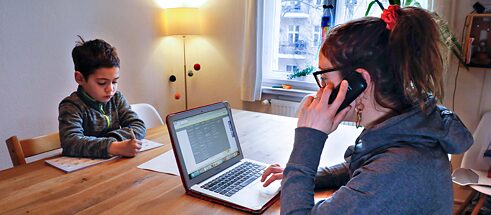Women in the pandemic
Working from Home – a New Opportunity or a Dead-End Street for Women?

The Corona crisis represents a turning point in our work culture – most of the work that used to be done at an office desk is now carried out from home. Does this mean more independence and freedom of action for everyone? Find out more in this interview with the social scientist Lena Hipp.
While some celebrate having to work from home in these times of Corona, the spatial and temporal blurring of the borders of the company workplace can also degenerate into considerable permanent stress for parents, for instance. This applies particularly to women, who, in addition to their jobs, still mostly play the role of family manager.
 Lena Hipp is head of the work and welfare research group at the Science Center Berlin (WZB) and professor in social structure analysis at the University of Potsdam.
| Photo: © David Ausserhofer
Ms. Hipp, you conducted an online study at the Wissenschaftszentrum Berlin (Berlin Science Centre) to examine the effects of the Corona pandemic on the work situation of people in Germany. How did you go about it?
Lena Hipp is head of the work and welfare research group at the Science Center Berlin (WZB) and professor in social structure analysis at the University of Potsdam.
| Photo: © David Ausserhofer
Ms. Hipp, you conducted an online study at the Wissenschaftszentrum Berlin (Berlin Science Centre) to examine the effects of the Corona pandemic on the work situation of people in Germany. How did you go about it?
Right at the beginning of the pandemic, we started an online survey in which we asked, what happens when mothers and fathers do not go to work, but stay at home. For example, does this lead to a different division of the unpaid work done in the home? That is the time in which you take care of children, do household chores and possibly look after and nurse other people who need care. We surveyed people in three waves in 2020. 6,397 respondents took part in all three surveys. We are currently conducting a fourth survey with the same people.
What do the results basically say so far?
Our results are consistent with data from many other studies. Although mothers and fathers organised childcare on an equal footing at the beginning of the pandemic, this trend unfortunately did not take a firm hold over time. It is particularly noteworthy that mothers were more likely than men to reduce their working hours – and that this effect even increased over time.
So are we threatened with a return to the old role models?
We cannot make a statement about this yet, it will only become apparent in the course of time. What is important, however, is that we to talk about the fact that the pandemic could lead to re-traditionalisation.
The concept of New Work and the idea of Work-Life-Blending have been around since the 1970s. They gave hope for more control of time and more freedom of action while working from home. Has the pandemic shown us that this is illusory?
In “normal” times, mobile working has many advantages: no commuting, more autonomy when organising time and work, more peace and quiet. At the same time, however, working from home means that the boundaries between work and leisure are becoming increasingly blurred. It can also mean that the work you are doing is not seen by others – by colleagues as well as by superiors. This is probably an even bigger problem for women than for men, because even before the pandemic, mobile working was much more of an opportunity for women to combine family and work than for men. Therefore, when it comes to deciding who will be promoted, a lot of working from home is certainly not beneficial for women. In principle, however, I think it is good that, as a result of the experience of the past year, there is a slight shift from the position that employees always have to be on site. What is important now is to find good regulations that take into account the interests of all employees.
Conversely – can the experiences from the pandemic also offer an opportunity for the time afterwards to increase the acceptance of working from home – for example, for women who take care of sick relatives?
I think many companies have realised that their employees also do a good job from home and usually even work much longer than they should. That has certainly increased the acceptance and also the view of the positive aspects of mobile working. At the same time, it has also become clear in many places that something is missing if you cannot meet up with colleagues for lunch or briefly pop into a colleague’s office to clarify an important question. In my opinion, it is now important, on the one hand, that a broad discussion should place about what work culture we want and where being present at the workplace is still necessary – also bearing in mind that the social integration function of work is not lost. On the other hand, we have to be careful that working from home is not primarily seen as a reconciliation tool for women. Care work – looking after children and caring for relatives – is not just women’s work. Men can also do it.
Do you think politics should be responsible for using the findings from the pandemic to promote new ways of working?
The measures that were additionally introduced during the pandemic do not point in this direction. The additional children’s sick days, for example, which parents can take advantage of when a child cannot be taken care of, are usually used by the parent or guardian who earns less money. And once again, it is mostly women. That is why we all have to become more innovative and courageous – not just politics and companies, but also every single one of us in our everyday family and working lives.